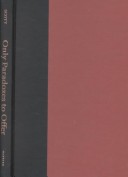When feminists argued for political rights in the context of liberal democracy they faced an impossible choice. On the one hand, they insisted that the differences between men and women were irrelevant for citizenship. On the other hand, by the fact that they acted on behalf of women, they introduced the very idea of difference they sought to eliminate. This paradox - the need both to accept and to refuse sexual difference in politics - was the constitutive condition of the long struggle by women to gain the right of citizenship. In this book, historian Joan Wallach Scott reads feminist history in terms of this paradox of sexual difference. Focusing on four feminist activists - Olympe de Gourges, who wrote the "Declaration of the Rights of Woman and Citizen" during the French Revolution; Jeanne Deroin, a utopian socialist and candidate for legislative office in 1848; Hubertine Auclert, "the" suffragist of the Third Republic; and Madeleine Pelletier, a psychiatrist in the early 20th century who argued that women must "virilize" themselves in order to gain equality - Scott charts the repetitions and variations in feminist history.
When sexual difference was taken to be a fundamental difference, when only men were regarded as individuals and thus as citizens, how could women also be citizens? The answers feminists offered to such questions are the subject of this book.
- ISBN10 0674639308
- ISBN13 9780674639300
- Publish Date 1 December 1996
- Publish Status Active
- Out of Print 7 October 2008
- Publish Country US
- Imprint Harvard University Press
- Format Hardcover
- Pages 246
- Language English
